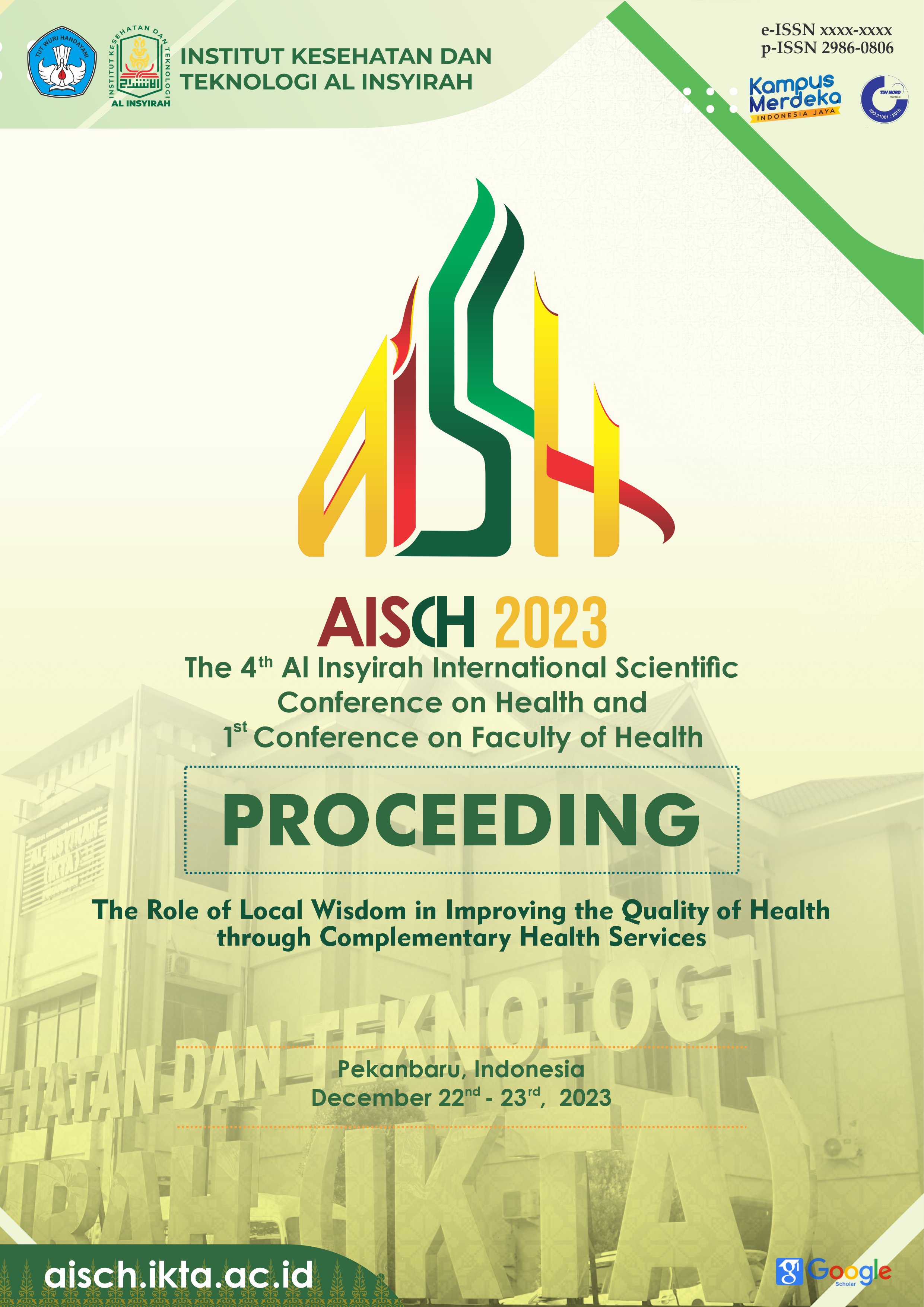THE EFFECT OF MUROTTAL THERAPY ON THE LEVEL OF ANXIETY IN MATERNITY AT BENGKALIS REGIONAL GENERAL HOSPITAL
Keywords:
Al-qur'an, Anxiety, Labor, MurrotalAbstract
Labor will be difficult if women are anxious about the labor process and the birth of the baby. Relaxation and traction treatment, one of which is murottal Al-Qur'an, can help to reduce anxiety. Because the duration and severity of contractions in the active phase gradually increased, murottal therapy was given during the first stage of the active phase. This experiment was done in July 2021 at Bengkalis Hospital to analyze the influence of murottal therapy on the level of anxiety in maternity mothers. A pre-experimental design with a One Group Pretest Posttest design technique is used in this kind of experiment. Purposive sampling was used to determine the sample size, which totaled 33 participants. This research instrument using the Hamilton Anxiety Rating Scale (Hars). Data analysis using Paired Sample T-Test showed that the majority of respondents had severe anxiety levels before murottal therapy (57.6%), and the majority of respondents after murottal therapy had moderate anxiety (54.5%), indicating that there was an effect of murottal therapy on the level of anxiety.With an average difference in score changes of 6.030 between before and after murottal therapy anxiety about delivery p = 0.000 (p value 0.05). As a result, it can be concluded that giving murottal therapy can make pregnant mothers feel calmer. It is hoped that it would be used as a non-pharmacological midwives care intervention as a therapeutic agent.
Downloads
References
A. A. S. Fatimah and L. N. Fadilah, “The Effect Of Murottal Al-Quran On The Reduction Of Anxiety In G1P0A0 Parturient Mothers During The Latent Phase Of First Stage,” Proceeding 4th Int. Conf. Interprofessional Heal. Collab. Community Empower., no. December, pp. 14–16, 2020.
N. W. Septiani, “No 主観的健康感を中心とした在宅高齢者における 健康関連指標に関する共分散構造分析Title,” vol. 1, pp. 1–14, 2017.
H. Hasnah, M. A. R. Kb, and M. Muaningsih, “Literatur Review: Tinjauan Tentang Efektifitas Terapi Non Farmakologi Terhadap Penurunan Intensitas Nyeri Persalinan Kala I,” J. Islam. Nurs., vol. 3, no. 2, p. 45, 2018, doi: 10.24252/join.v3i2.6854.
P. Primasnia, - Wagiyo, and - Elisa, “Hubungan Pendampingan Suami Dengan Tingkat Kecemasan Ibu Primigravida Dalam Menghadapi Proses Persalinan Kala I Di Rumah Bersalin Wilayah Kota Ungaran,” J. Ilmu Keperawatan dan Kebidanan, vol. 1, no. 4, pp. 212–216, 2013, [Online]. Available: http://pmb.stikestelogorejo.ac.id/e-journal/index.php/ilmukeperawatan/article/view/184
B. Yuni Fitri Hamidiyanti and I. Gumilang Pratiwi, “Effect of Listening to the Quran on Anxiety Level in Primipara,” Heal. Spiritual. Med. Ethics, vol. 6, no. 1, pp. 52–56, 2019, doi: 10.29252/jhsme.6.1.52.
S. Wahyuni and N. Komariah, “Efektifitas Terapi Murottal-Qur’an Dan Musik Klasik Terhadap Tingkat Kecemasan Ibu Bersalin Di Bpm Teti Herawati Palembang,” J. Keperawatan Suaka Insa., vol. 5, no. 2, pp. 198–204, 2020, doi: 10.51143/jksi.v5i2.248.
S. Karyati, “Aplikasi Terapi Murotal Al-Qur’An Dan Komunikasi Terapeutik Sebagai Upaya Menurunkan Tingkat Kecemasan Persalinan,” 4 th Univesity Res. Coloquium, pp. 175–182, 2016.
R. Uin and A. Makassar, 198222344. 2014.
P. Persiapan, K. Calon, P. Di, and P. Kedondong, “1). , 2) , 3),” 2023.
Downloads
Published
Issue
Section
License
Copyright (c) 2024 Al Insyirah International Scientific Conference on Health

This work is licensed under a Creative Commons Attribution 4.0 International License.


